With HSE annual workplace fatality statistics showing little signs of improvement, the need to reduce the excessively high rate of accidents in the industry remains as great as ever.
To mark the start of Farm Safety Week (July 16-20), HSE has announced its latest report showing the annual fatal injuries in agriculture in Great Britain in 2017/2018 .
Over the past year 29 fatal injuries to agricultural workers were recorded in the report and the sector continues to account for a large share of the annual fatality count (20%). Farming has the highest rate of fatal injury of all the main industry sectors, around 18 times higher than the all industry rate. The new HSE stats for 2017/2018 reveal that nearly half the workers killed (14 of 29) were over 65.
The report also highlights that animals were the main cause of fatal accidents among farm workers, accounting for almost a quarter (24%) of all workplace fatalities. Other causes included being struck by farm vehicles such as tractors or trailers (18%), trapped by something collapsing (15%) and being struck by objects such as bales and tree branches (12%). Most of the agricultural fatalities occurred Yorkshire and the Humber (21%), followed by Wales (18%) and Scotland and the South West which each accounted for 15%.
The Farm Safety Foundation, Farm Safety Partnerships, the Health & Safety Executive, Health & Safety Executive for Northern Ireland and Health & Safety Authority, Ireland have once again joined forces to drive the initiative.
Farm Safety Week aims to reduce the number of accidents which continue to give farming the poorest safety record of any occupation in the UK & Ireland
This year, Farm Safety Week will also focus on the issue of child safety on farms. Accidents on farms can be life changing, both for those involved and their families. It is even more devastating when it involves a child and unfortunately two of the fatal injuries in the past year involved children, which is why Farm Safety Foundation is encouraging farmers to be extra vigilant and take every precaution to make their farms safe for children.
Farming Minister George Eustice said: “The farming industry is essential to our national economy – employing more than 340,000 people – and plays a vital role in producing the food that we all know and love.
“Initiatives, such as Farm Safety Week, are important in raising awareness of good workplace practice, and I encourage farmers across the UK to read this week’s case studies, articles and blogs to help understand how they can stay safe at work.”
Stephanie Berkeley from the Farm Safety Foundation said: “Farms can be wonderful places for children to grow up, but the sad fact is that farms are the only workplace where children continue to die, which is heart-breaking for the families involved and a horrific tragedy for their communities. We want to highlight the importance of child safety on farms and urge farming families to talk openly about farm safety and make it their priority.
“Many of those injured or killed on our farms have been doing this all their lives. In the HSE report 48% of this year’s fatalities were farm workers over the age of 65. Unlike other occupations, farmers don’t tend to retire at 65 and often work well into their 80s. Factors such as health, agility and stubbornness combine with risk-taking, fatigue and improperly maintained machinery to create this ‘risk’ nightmare.”
NFU vice president Stuart Roberts added: “Safety is not just one week. Safety is something that should be in our minds every day we are at work.
“Farm Safety Week is a way to help move safety right up the agenda and set us up for a year of change and improvement. Farm Safety Week is an industry wide focus on safety and how things can change in the United Kingdom and Republic of Ireland.”


